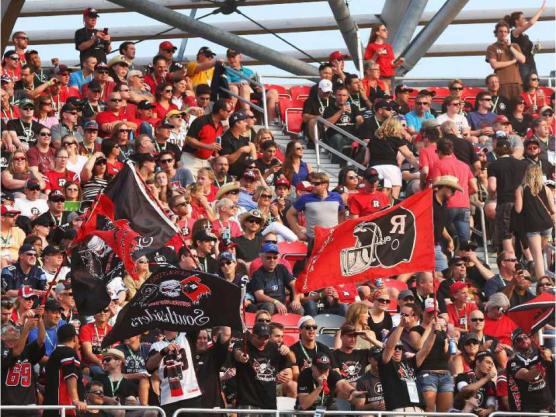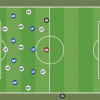Sirs:
This message is intended for the individual who recently attended the RedBlacks game on August 31, 2015 and refused to cease and desist from hurling inappropriate comments to the opposing players and personnel.
Since our exchange in the stands this past Sunday, I’ve been thinking about how to respond.
Perhaps you didn’t notice that I’ve been attending games with my 5-year old son and my husband. This year my husband decided to treat the family and buy season tickets. We both really enjoy football. In fact, it was one of our first dates and we want to share that together as a family.
However, rather than fully enjoying the thrill of the game, I spent it responding to my son asking: “Mom, is it funny when that man makes fun of people? …but there are other grown-ups laughing.” That’s why I asked you again to stop heckling the opposing team members.
Every home game, your verbal assault on the opposing team starts as soon as they take the bench and continues for the whole game. It generally becomes repetitive by the second quarter given your limited repertoire. Your litany includes mocking people for: their weight, hair, and name, being a kicker, wearing safety gear or other equipment or standing/sitting alone on the bench.
Sadly, instead of hearing what I was saying when I asked you to stop your inappropriate name-calling, your first response was to lash out at me (which is usually how bullies handle someone questioning their behaviour). Your reaction – calling me an ‘overly sensitive female’, followed by a thinly veiled threat that I am ‘really putting myself out there’ – is just another example of your bullying behaviour. Bystanders often don’t stand up to bullying because they fear becoming the target. You attempted to make me the target.
So I’m going to repeat my request, this time for future games because I firmly believe that “the only thing necessary for the triumph of evil is for good [people] to do nothing” (Edmund Burke) and because I need to be a role model for my son.
Please do not hurl abuse at football games, hockey games, public sporting events, or public events; ideally, avoid hurling abuse in private too.
The old adage “if you don’t have anything nice to say, don’t say anything at all” works well if you’re trying not to be a bully. But, in case it’s not clear: It is not okay to mock and verbally harass people because:
• of their weight, hair or name
• they are standing or sitting alone on the sidelines
• of their equipment or gear
• of their career choice, ie. being a kicker
The logic of “this is a sporting event and so this behaviour is ok” is dangerous. It is in line with:
• I can sexually assault that person because they’re passed out, after all they didn’t say “no” and we are at a party or she was asking for it because of the way she was dressed
• I can be rude/obnoxious/cause harm because that person is different or somehow lower than me
• I don’t have to be responsible for my behaviour because I am drunk
Bullying is a hot button issue in the media, in schools and in my heart. It impacts all of us in one way or another, some with more devastating consequences than others. Every day, each of us makes a choice, to be part of the problem or part of the solution, with our actions and/or our silence. I, for one, will not allow you to teach my child (or others) that hurtful words are okay or that there are different rules because we are at a sporting event.
Here are some sobering facts:
• Canada has the 9th highest rate of bullying in 13 year olds on a scale of 35 countries (1)
• Bullying causes a number of social, physical and mental health problems for the bully and the bullied and mental health problems associated with bullying tend to last until later in life(2)
• Children who are bullied & those who bully are at greater risk of suicide (3)
• Suicide is the 3rd leading cause of death among young people and a study in Britain found that at least ½ of suicides among young people are related to bullying (4)
• By the age of 14 less than 30% of boys & 40% of girls will talk to their peers about bullying (5)
• The destructive lessons learned in childhood re: the negative use of power (bullying) may translate into sexual harassment in the workplace, dating violence, marital abuse, child abuse and elder abuse (6)
• 40% of Canadian workers experience bullying on a weekly basis (7)
As a parent, I work hard to raise my child to be a good global citizen. At home, we talk a lot about bullying and we discuss the programs in the school re: bullying and how to stop it. I am an important role model for my son, so we tried ignoring your behaviour, walking away from it and definitely did not participate in it.
Maybe one of the reasons that kids stop talking about bullying is because adults are modelling the wrong behaviour. We can wear all the pink shirts and bracelets we want, we can put up posters and teach techniques in school but until our words match our actions – at home, in school and in public – we are going to keep losing kids and will only perpetuate the cycle.
You can cheer on your team without demeaning other teams; that’s what a true fan does. You are not a better fan for being verbally abusive to the opposing team. In fact, a good fan makes the experience enjoyable for others by not creating a hostile & unfriendly environment!
Sporting events and venues across North America have adopted Codes of Conduct for their fans which reflect the core values of their communities. They’re enshrined in a sense of mutual respect and good sportsmanship.
Fans have a right to expect an environment where:
• Fans are encouraged to cheer, sing, and otherwise support their team while remaining respectful and courteous to their fellow patrons, referees, opposing team fans and players.
• Fans enjoy the experience free from political or inciting messages, and disorderly behavior, including demeaning, disrespectful, foul, sexist, racial, obscene or abusive language or gestures.
Typically, sports organizations which have adopted Codes of Conduct also include potential sanctions with the following proviso:
FAILURE TO ABIDE BY THIS CODE OF CONDUCT IS SUBJECT TO SANCTIONS, INCLUDING EJECTION, BANISHMENT AND ARREST.
I wish for you none of the above.
I simply want you to change your repertoire at this public event, by eliminating the inappropriate, unnecessary ridicule, demeaning and disrespectful comments you gratuitously hurl at opposing players and personnel in our presence. You do not own the public space you occupy at a football game. It isn’t your living room. You must respect the people in your vicinity. They may not share your views, traditions or values.
At the very least, I hope this simple message reaches you and raises your awareness. Once empowered with the burden of awareness, it becomes inexcusable to perpetuate the mischief. That is, by all normal standards!
Respectfully,
Naomi
www.stopbullying.gov
www.kidpower.org
c.c. RedBlacks (OSEG)
(1)Canadian Institute for Health Research
(2)www.prevnet.ca/bullying
(3)www.prevnet.ca/bullying
(4)www.bullyingstatistics.org
(5)www.dosomething.org
(6)www.prevnet.ca/bullying
(7)Canadian Institute for Health Research
















